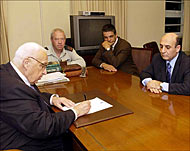Israel bans settler influx into Gaza
Israel has banned its citizens from moving into Jewish settlements in the Gaza Strip, aiming to forestall a feared influx of ultra-nationalists bent on blocking a pullout from the occupied territory this summer.

The military issued the decree as the government scheduled a crucial parliamentary debate over the 2005 state budget on 29 March. It must be passed by 31 March or Prime Minister Ariel Sharon will be forced into a snap election, shelving the Gaza withdrawal.
Palestinian President Mahmud Abbas persuaded Palestinian resistance groups on Thursday to extend until the year’s end a de facto truce, easing a threat of renewed attacks on settlers that might delay a pullout and brightening prospects for follow-up peace negotiations.
But even as violence in Gaza subsided, Israeli media have
reported a wave of rightist Jews changing their address to
settlements in the area in an effort to swell their 8500
population and thwart troops assigned to evacuate them.
In a statement, the army said it had issued orders “prohibiting the relocation of Israeli citizens into the Gaza Strip”, namely 21 settlements earmarked for removal under Sharon‘s effort to “disengage” from conflict with the Palestinians.
“The decree was signed in accordance with the decision made
by the political echelon and preparations to implement the
decision to carry out the Disengagement Plan,” it said.
Hundreds of Israelis have switched their addresses to the Gush Katif settlement block, newspapers say, with the idea of dodging its expected closure to non-residents in the weeks before the launch of evacuations, due on 20 July.
|
“This is preparation for creating ethnic cleansing here” |
A spokesman for Gaza settlers condemned the army’s action. “This is preparation for creating ethnic cleansing here. It’s an immoral decision. Hundreds of thousands of supporters will come here whether they have identity cards with a (Gaza settlement) address or not,” Eran Sternberg said.
Pullout
In another sign of progress in the withdrawal process, the army plans to pull out some non-combat equipment and minor structures that are “unrelated to security” from the Gaza Strip in two weeks, a military source said on Friday.
Sharon regards Gaza, where the army is bogged down shielding scattered Jewish enclaves, as a bloody quagmire without strategic worth, and polls show most Israelis agree it should be abandoned.
He aims to keep larger settlements in the West Bank under any future peace deal, raising Palestinian fears about creating a viable state in both territories, as envisaged by a US-devised peace plan.
But to Israeli rightists, including those in Sharon‘s Likud party, any pullout amounts to “rewarding terror”. They have escalated a protest campaign.
Another hurdle for Sharon is Israel‘s budget, for which Sharon still lacks a majority because a dozen mutinous Likud deputies in the Knesset have vowed to reject it.
A senior government official said the budget session was set
for 29 March to ensure time for debate before a 31 March deadline to pass the budget.
|
|
|
Sharon is set on getting the |
“Sharon will do everything in his power to get the budget passed, whether by additional votes in favour or through abstentions by those who would otherwise vote against,” he said.
The accord Abbas struck with fighters after 48 hours of talks in Egypt should advance his quest to revive negotiations with Israel on a Palestinian state after four years of fighting.
The Popular Resistance Committees (PRC), a loose bloc of Palestinian fighters who are not party to the deal, threatened on Friday to resume attacks, saying it had not been invited to the talks.
Asked about the warning, Abbas said: “This is an internal matter we will deal with … (The truce deal) was a Palestinian success. I expect everyone to remain committed and there should not be violations.”
